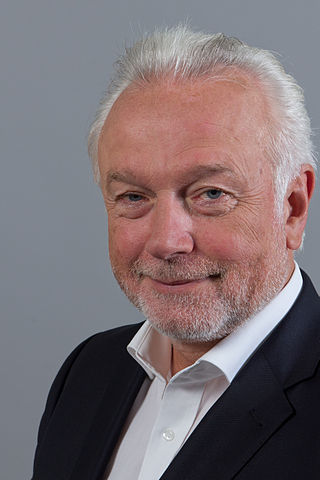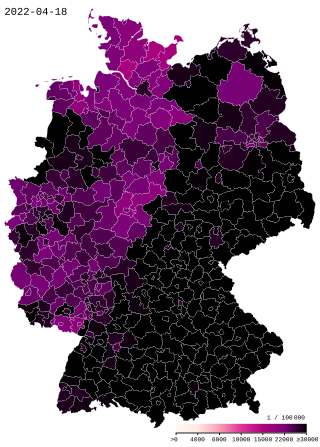Related Research Articles

Wolfgang Kubicki is a German politician of the Free Democratic Party of Germany (FDP) and member of the Bundestag from 1990 until 1992 and 2017 onwards. He has been vice chairman of the FDP in Germany since December 2013. Since 24 October 2017 he has served as Vice President of the Bundestag. From 1992 to 1993 and from 1996 to 2017 he served as chairman of the FDP-group in the Schleswig-Holstein state parliament.
The Standing Committee on Vaccination at the Robert Koch Institute, or STIKO, is a scientific committee comprising 18 members at the Robert Koch Institute in Berlin, Germany that provides official recommendations for the vaccination schedules used by the individual German states. The committee meets twice yearly to review the latest research regarding vaccination against infectious diseases. Although the STIKO makes recommendations, immunization in Germany is voluntary and there are no official government recommendations. German Federal States typically follow the STIKO's recommendations minimally, although each state can make recommendations for their geographic jurisdiction that extends beyond the recommended list. In addition to the proposed immunization schedule for children and adults, the STIKO recommends vaccinations for occupational groups, police, travelers, and other at risk groups.

The COVID-19 pandemic in Germany has resulted in 38,437,756 confirmed cases of COVID-19 and 174,979 deaths.

Christian Heinrich Maria Drosten is a German virologist whose research focus is on novel viruses (emergent viruses). During the COVID-19 pandemic, Drosten came to national prominence as an expert on the implications and actions required to combat the illness in Germany.

Andrew John Ullmann is a German physician and politician of the Free Democratic Party (FDP) who has been serving as a member of the Bundestag from the state of Bavaria since 2017.

Uğur Şahin is a German oncologist and immunologist. He is the founder and CEO of BioNTech, which developed one of the major vaccines against COVID-19. His main fields of research are cancer research and immunology.

COVID-19 vaccination in Switzerland is an ongoing immunization campaign against severe acute respiratory syndrome coronavirus 2 (SARS-CoV-2), the virus that causes coronavirus disease 2019 (COVID-19), in response to the ongoing pandemic in the country.

EpiVacCorona is a peptide-based vaccine against COVID-19 developed by the Russian VECTOR Center of Virology. The lack of protective effectiveness of EpiVacCorona, which is still in use in Russia, has been reported in scientific literature and in the media. The vaccine consists of three chemically synthesized peptides that are conjugated to a large carrier protein. This protein is a fusion product of a viral nucleocapsid protein and a bacterial MBP protein. A phase III clinical trial to show whether or not the vaccine can protect people against COVID-19 was launched in November 2020 with more than three thousand participants. The conclusions and results of the trial have not been made public.

COVID-19 vaccination in South Africa is an ongoing immunisation campaign against severe acute respiratory syndrome coronavirus 2 (SARS-CoV-2), the virus that causes coronavirus disease 2019 (COVID-19), in response to the ongoing pandemic in the country.
COVID-19 vaccination in Botswana is an ongoing immunisation campaign against severe acute respiratory syndrome coronavirus 2 (SARS-CoV-2), the virus that causes coronavirus disease 2019 (COVID-19), in response to the ongoing pandemic in the country.

COVID-19 vaccination in New Zealand began on 20 February 2021, and will continue throughout the pandemic with the goal of vaccinating all willing New Zealanders aged 5 or older. Those aged 5 to 11 require a parent, caregiver or legal guardian accompany them to their appointment and provide consent for them to be vaccinated. As of 1 September, anyone in New Zealand, regardless of their immigration status, is eligible to be vaccinated.

The COVID-19 vaccination campaign in Germany began on 26 December 2020.

The COVID-19 vaccination in Singapore is an ongoing immunisation campaign against severe acute respiratory syndrome coronavirus 2 (SARS-CoV-2), the virus that causes coronavirus disease 2019 (COVID-19), in response to the ongoing pandemic in the country. Singapore has a very high vaccination rate, with more than 92% of its total population having completed their vaccination regimen.

The COVID-19 vaccination campaign in Ukraine is an ongoing mass immunization campaign for the COVID-19 pandemic in Ukraine.

COVID-19 vaccine hesitancy in the United States is the sociocultural phenomenon of individuals refusing or displaying hesitance towards receiving the COVID-19 vaccine. COVID-19 vaccine hesitancy in the United States can be considered as part of the broader history of vaccine hesitancy.

Anti-vaccination activists and other people in many countries have spread a variety of unfounded conspiracy theories and other misinformation about COVID-19 vaccines based on misunderstood or misrepresented science, religion, and law. These have included exaggerated claims about side effects, misrepresentations about how the immune system works and when and how COVID-19 vaccines are made, a story about COVID-19 being spread by 5G, and other false or distorted information. This misinformation has proliferated and may have made many people averse to vaccination. This has led to governments and private organizations around the world introducing measures to incentivize or coerce vaccination, such as lotteries, mandates, and free entry to events, which has in turn led to further misinformation about the legality and effect of these measures themselves.

Over the course of the COVID-19 pandemic, COVID-19 vaccine mandates have been enacted by numerous states and municipalities in the United States, and also by private entities. In September 2021, President Joe Biden announced that the federal government would take steps to mandate COVID-19 vaccination for certain entities under the authority of the federal government or federal agencies. Most federal mandates thus imposed were either overturned through litigation, or withdrawn by the administration, although a mandate on health care workers in institutions receiving Medicare and Medicaid funds was upheld. All federal mandates were lifted when the national emergency was declared to have ended in May 2023. A small number of states have gone in the opposite direction, through executive orders or legislation designed to limit vaccination mandates.

A vaccine passport or proof of vaccination is an immunity passport employed as a credential in countries and jurisdictions as part of efforts to control the COVID-19 pandemic via vaccination. A vaccine passport is typically issued by a government or health authority, and usually consists of a digital or printed record. Some credentials may include a scannable QR code, which can also be provisioned via mobile app. It may or may not use a COVID-19 vaccine card as a basis of authentication.

The government of Germany has initially responded to the COVID-19 pandemic in the country with preventive measures to curb the spread of the coronavirus disease 2019 in the country. With the nationwide spread of the disease from March 2020, preventive measures were replaced by containment measures, including a lockdown from March. On 25 March, the Bundestag made the determination of an epidemic situation of national significance. This created a legal framework for the government of chancellor Angela Merkel and the heads of the 16 German states to agree on nationwide pandemic restrictions. Implementation of decisions by that panel remained a matter of individual states, however, leading to differences in anti-pandemic rules and regulations across states.
The 2022–2023 mpox outbreak in Germany is part of an ongoing global outbreak of human mpox caused by the West African clade of the monkeypox virus. At the beginning of September 2022, Spain, France, Germany and the United Kingdom are the countries with most cumulative cases in Europe.
References
- 1 2 "Prof. Thomas Mertens". www.bundesregierung.de (in German). n.d. Retrieved 18 August 2022.
- ↑ "Germany: Top vaccine advisory body STIKO holds off endorsing vaccine for teens". Deutsche Welle . 3 August 2021. Retrieved 18 August 2022.
- ↑ ""Fake News halten sich im Internet hartnäckig" (Interview with Wolfgang Geissel)". Ärzte-Zeitung (in German). 13 April 2017. Retrieved 19 August 2022.
- ↑ Geinitz, Christian (17 November 2021). "Ruhepol der Wissenschaft". FAZ (in German). Retrieved 18 August 2022.
- 1 2 Spielberg, Petra (31 March 2017). "Thomas Mertens: Virologe ist neuer Leiter der STIKO". Deutsches Ärzteblatt (in German). Retrieved 18 August 2022.
- ↑ "Stiko wird personell neu aufgestellt – Chef Mertens hört auf". Der Spiegel (in German). 23 November 2023. Retrieved 23 November 2023.
- 1 2 3 "Dieser Ruheständler entscheidet, wie Deutschland gegen Corona impft". Wirtschaftswoche (in German). 4 July 2021. Retrieved 18 August 2022.
- 1 2 Peduto, Alessandro (20 December 2021). "Wie der Stiko-Chef bei Corona-Impfungen für Verwirrung sorgt". Berliner Morgenpost (in German). Retrieved 18 August 2022.
- ↑ "CSU-Landesgruppenchef Dobrindt: "Große Schwachstelle", dass es kein Impfangebot für Jüngere gibt (Interview with Katharina Hamberger)". Deutschlandfunk (in German). 11 July 2021. Retrieved 19 August 2022.
- ↑ "Stiko-Chef Mertens: Druck wegen Kinderimpfung ist "absurd"". FAZ (in German). 30 September 2021. Retrieved 19 August 2022.
- ↑ Hairapetian, Marc (17 November 2021). "Markus Lanz (ZDF): Stiko-Chef lässt beim Corona-Talk die Booster-Bombe platzen". Frankfurter Rundschau (in German). Retrieved 20 August 2022.
- ↑ "COVID vaccinations in Germany will take over a year - expert panel head". Reuters . 2 December 2020. Retrieved 18 August 2022.
- ↑ "Stiko-Chef Mertens: "Wir müssen die Impfunwilligen überzeugen!"". BR (in German). 25 September 2021. Retrieved 18 August 2022.
- ↑ "Stiko-Chef Mertens bedauert persönliche Aussage zur Kinderimpfung". Der Spiegel (in German). 10 December 2021. Retrieved 19 August 2022.
- ↑ "Pressemitteilung der STIKO zur COVID-19-Impfempfehlung für Kinder von 5-11 Jahren und für Personen mit durchgemachter SARS-CoV-2-Infektion und bisher unvollständiger Immunisierung (20. Aktualisierung)". RKI (in German). 24 May 2022. Retrieved 19 August 2022.
- ↑ "Expertenrat für Vorbereitung weiterer Corona-Schutzmaßnahmen". Deutschlandfunk (in German). 23 January 2022. Retrieved 18 August 2022.
- ↑ "Stiko-Chef Mertens lehnt allgemeine Corona-Impfpflicht ab". Die Welt (in German). 13 January 2022. Retrieved 19 August 2022.
- ↑ "Stiko-Chef Mertens begrüßt Aus für Impfpflicht ab 18". Stuttgarter Nachrichten (in German). 5 April 2022. Retrieved 22 April 2022.
- ↑ "Virologe Mertens: "Ich könnte alle diese Impfempfehlungen auch heute noch unterschreiben"". Ärzte-Zeitung (in German). 23 November 2023. Retrieved 23 November 2023.